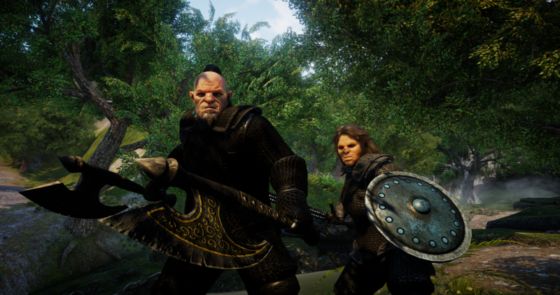As part of our ongoing exploration of the ambitious upcoming MMORPG Pantheon: Rise of the Fallen, we’ve invited the world’s super-fantheons to contribute guest posts to MMOGames’ The Pantheon Series.
In this month’s guest post, we welcome the one-and-only BazgrimTV to MMOGames with open arms. As a seasoned veteran of crowdfunded MMOs, BazgrimTV shares his experiences of the highs and lows of crowdfunding massively multiplayer online games, as well as his strategies for dealing with their challenges.

In 1967, psychologist Martin Seligman conducted an experiment that would be considered cruel by today’s standards, but led to an unexpected and life-changing discovery. In the experiment, two sets of dogs were given a mild shock collar and individually placed in a crate with a lever. For the first set of dogs, pressing the lever prevented them from being shocked. For the second set of dogs, pressing the lever did nothing. When the shock collar was activated, both sets of dogs tried to press the lever to avoid being shocked again. But the dogs with the useless lever soon realized that it wasn’t helping, so they stopped trying and just took the shock. See what I meant about it being cruel?
The discovery occurred when both sets of dogs were then placed in a different crate. Instead of a lever, there was a small barrier dividing the crate in half. The dogs could see over the barrier, and they could easily jump over it. This time, both sets of dogs would get shocked if they were on the left side of the crate, but could avoid the shock by jumping over the barrier to the right side. The first set of dogs (who had the shock-preventing lever in the previous crate) all immediately figured out what was going on in this new crate and jumped over the barrier. But much to the surprise of the researchers, when the second set of dogs were each placed in that crate, the vast majority of them didn’t move. They simply laid down and braced for the shock they expected. Even though the circumstances had changed and they now had a real opportunity to stop the pain, these dogs were under the illusion that, because of their past experience, they still had no control over the outcome. It didn’t take them long to convince themselves that their inability to avoid pain was permanent and universal. This phenomenon is now known as “learned helplessness.”
By now, you might be wondering where I’m going with this depressing story. Well, learned helplessness doesn’t only apply to dogs. It’s common in us humans as well. The good news is this discovery has helped a lot of people overcome the past and take control of their lives. I was intrigued to find an example of learned helplessness when I surveyed the current mindset of MMORPG fans. The genre as a whole has been “shocked” countless times over the past decade or so. Between games canceled before they got off the ground, games failing soon after release, and old favorites getting shut down, it’s been pretty painful if you’re looking for an MMORPG to call home. It appears this has caused many MMO fans to stop hoping and start coping with any prospect of a new game. It’s as if they’re bracing to be “shocked” before it even happens.
I’ve found this to be especially true when it comes to crowdfunded MMORPGs -- particularly the one I follow closest, Pantheon: Rise of the Fallen. Pantheon started solely as a grassroots crowdfunding effort and is still mostly crowdfunded. It's one of several crowdfunded MMOs that emerged around 2014 because, after years of AAA studios having very little success with MMOs, most publishers stopped risking millions of dollars upfront on any new ones. This meant developers who felt the need to create a new MMO would need to team up with the fans themselves.
Unlike traditional, behind-closed-doors development, crowdfunded MMOs give you, the fan, an opportunity to contribute, which supposedly increases the chances of that game being released. In other words, there’s a “lever” that may or may not give you some degree of control over the chances of being “shocked.” Although, it’s actually much more complicated than that because no individual has complete control over whether a crowdfunded MMORPG is successful. It takes a whole community pitching in to even give the project a chance.

So it’s more like a situation where there’s a bunch of dogs in a crate with a barrier in the middle, and if enough dogs decide to jump over the barrier to the other side, none of them will get shocked. But none of them know how many dogs it’ll take. And there’s the big twist that even if enough dogs jump to the other side, there’s still a chance that the researchers (developers) might end up shocking them anyway. This becomes quite the social predicament when most of the dogs are suffering from learned helplessness.
Crowdfunded MMOs are no exception to the many woes the genre has endured in recent memory. I’ve lost track of how many times I’ve heard people say things like “I got burned by _<fill in the blank>_. I’m never backing another game again,” when talking about a crowdfunded project where they got "shocked" even after “pressing the lever." If you’re one of those people, I feel your pain. I was “shocked” by EverQuest Next. There were some warning bells before it got canceled, so I wasn’t shocked in the sense that it surprised me. But it still hurt. As a lifelong EverQuest fan who was unhappy with other MMOs available at the time, I was excited by all the new features that EQN promised. I quickly jumped onboard and pressed whatever “levers” I could… only to find out that it never made a difference after all.
At that point, I could have joined the many people who had disavowed all forms of crowdfunding, and even given up on MMOs altogether. But I was aware of the trap of learned helplessness. I knew that other projects I encountered might not be the same exact situation I encountered before. So when I came upon Pantheon shortly after EverQuest Next was canceled, I decided to approach it a bit more methodically. I’ll outline my journey in hopes that you might find it helpful as well:
1. Investigate. Rather than assuming you know where a project is going, first make sure you know exactly what kind of “crate” you’re getting into. This will help you avoid going all-in on nothing but hype and hope or, conversely, bracing to be “shocked” at the slightest hint of a warning bell. When I first found out about Pantheon, I spent several months learning everything I could about it. Even when I thought I had a good grasp, I looked some more. Whether it was good or bad, I kept digging. Through that process, it became clear to me that Pantheon was (and is) a very unique project. Of course, there are some similarities to other projects. But it’s a different company with different goals and different methods. While no company or game is without their flaws, I was able to reach a point where I was reasonably convinced that Visionary Realms’ plans for Pantheon were something I felt the genre needed... and more importantly, that they had the grit to get it done (eventually). It was then that I decided to jump to the other side of the “crate.”
2. Conversate. With any crowdfunded project, it’s important to remember that opening up your wallet isn’t the only way to “jump the barrier.” In fact, as you can tell by my list here, I would actually suggest holding off on that step until later. Yes, MMOs need a lot of money, but they also need healthy communities. And helping with that is completely free. I personally started off by posting frequently on the official Pantheon forums, welcoming newcomers and answering any questions they may have. On this side of the Pantheon “crate,” I found a community full of excellent people who have taught me a lot, many of whom I call friends. I later started a YouTube channel where I aim to make it easier for people to learn about Pantheon and its development process. But you don’t have to take it nearly that far to be a valuable part of a community. Even by talking about a game on social media, Reddit, etc. you are doing something meaningful. An active community helps spread the word, provides valuable feedback to developers, and shows potential investors/publishers that the game already has an engaged audience.
3. Donate. If you’ve researched the project, found value in engaging with the community, and you’re in a financial position where you can afford to take risks, then you may want to consider contributing financially. It's a more direct way to fuel the development efforts, but only you can decide if it’s right for your situation.
So whether you donate some dough or discuss in the Discord (or wherever you prefer to chat), you are exercising some degree of control over the chances of a project being successful. But remember, the future is impossible to predict and there is always some degree of risk involved. You could do all of the above steps and still get “shocked;” but actively influencing the future of something you want, even in a minor way, is a great way to avoid becoming despondent.
The only way the genre will ever get better is if we the players remain open to the possibility. From where I’m standing in the Pantheon “crate,” the chances of getting “shocked” are looking less and less likely. But I've also found that making so many great friends and memories, even while following the game’s development, somehow makes the outcome seem a little less daunting.
BazgrimTV is one of the leading sources of informative coverage on Pantheon: Rise of the Fallen. With a deep-rooted passion for challenging and community-driven MMORPGs, he has been following the development of Pantheon closely since 2016; and in October 2017, became the first fan to ever play the game.
He has been sharing his findings and adventures with fans from around the globe on his YouTube channel, where readers can discover gameplay streams, exclusive developer interviews, vlogs, commentary, and much more. Beyond his love for Pantheon, he has two decades of diverse gaming experience and a degree in Psychology - a history that has led him to seek insight into why people play games, how to excel at them, and more importantly, how the lessons we learn from MMOs can be applied to improve real life. We also recommend showing him your support on Facebook, Twitter, Instagram, and Patreon.
If you enjoyed this article on Pantheon and crowdfunded MMOs, don’t forget to check out the rest of The Pantheon Series - including our last guest post by PantheonPlus. MMOGames is committed to bringing you all the freshest, funniest, and best MMO gaming news and content. Make sure that you never miss our updates and exclusive giveaways by following and favouriting us on Instagram, Twitter, and Facebook.